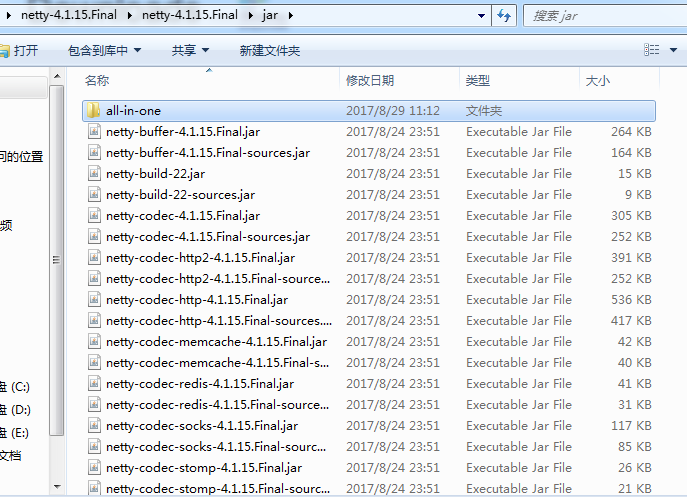转载请注明出处:http://www.cnblogs.com/Joanna-Yan/p/7447618.html
有兴趣的可先了解下:4种I/O的对比与选型
主要内容包括:
- Netty开发环境的搭建
- 服务端程序TimeServer开发
- 客户端程序TimeClient开发
- 时间服务器的运行和调试
1.Netty开发环境的搭建
前提:电脑上已经安装了JDK1.7并配置了JDK的环境变量path。
从Netty官网下载Netty最新安装包,解压。

这时会发现里面包含了各个模块的.jar包和源码,由于我们直接以二进制类库的方式使用Netty,所以只需要netty-all-4.1.15.Final.jar即可。

新建Java工程,引入netty-all-4.1.15.Final.jar。
2.Netty服务端开发
在使用Netty开发TimeServer之前,先回顾一下使用NIO进行服务端开发的步骤。
- 创建ServerSocketChannel,配置它为非阻塞模式;
- 绑定监听,配置TCP参数,例如backlog大小;
- 创建一个独立的I/O线程,用于轮询多路复用器Selector;
- 创建Selector,将之前创建的ServerSocketChannel注册到Selector上,监听SelectionKey.ACCEPT;
- 启动I/O线程,在循环体中执行Selector.select()方法,轮询就绪的Channel;
- 当轮询到了就绪状态的Channel时,需要对其进行判断,如果是OP_ACCEPT状态,说明是新的客户端接入,则调用ServerSocketChannel.accept()方法接受新的客户端;
- 设置新接入的客户端链路SocketChannel为非阻塞模式,配置其他的一些TCP参数;
- 将SocketChannel注册到Selector,监听OP_READ操作位;
- 如果轮询的Channel为OP_READ,则说明SocketChannel中有新的就绪的数据包需要读取,则构造ByteBuffer对象,读取数据包;
- 如果轮询的Channel为OP_WRITE,说明数据还没有发送完成,需要继续发送。
一个简单的NIO服务端程序,如果需要我们直接使用JDK的NIO类库进行开发,竟然需要经过繁琐的十多步操作才能完成最基本的消息读取和发送,这也是我们选择Netty等NIO框架的原因了,下面我们看看使用Netty是如何轻松搞定服务端开发的。
package joanna.yan.netty; import io.netty.bootstrap.ServerBootstrap; import io.netty.channel.ChannelFuture; import io.netty.channel.ChannelInitializer; import io.netty.channel.ChannelOption; import io.netty.channel.EventLoopGroup; import io.netty.channel.nio.NioEventLoopGroup; import io.netty.channel.socket.SocketChannel; import io.netty.channel.socket.nio.NioServerSocketChannel; public class TimeServer { public static void main(String[] args) throws Exception { int port=9090; if(args!=null&&args.length>0){ try { port=Integer.valueOf(args[0]); } catch (Exception e) { // 采用默认值 } } new TimeServer().bind(port); } public void bind(int port) throws Exception{ /* * 配置服务端的NIO线程组,它包含了一组NIO线程,专门用于网络事件的处理,实际上它们就是Reactor线程组。 * 这里创建两个的原因:一个用于服务端接受客户端的连接, * 另一个用于进行SocketChannel的网络读写。 */ EventLoopGroup bossGroup=new NioEventLoopGroup(); EventLoopGroup workerGroup=new NioEventLoopGroup(); try { //ServerBootstrap对象,Netty用于启动NIO服务端的辅助启动类,目的是降低服务端的开发复杂度。 ServerBootstrap b=new ServerBootstrap(); b.group(bossGroup, workerGroup) .channel(NioServerSocketChannel.class) .option(ChannelOption.SO_BACKLOG, 1024) /* * 绑定I/O事件的处理类ChildChannelHandler,它的作用类似于Reactor模式中的handler类, * 主要用于处理网络I/O事件,例如:记录日志、对消息进行编解码等。 */ .childHandler(new ChildChannelHandler()); /* * 绑定端口,同步等待成功(调用它的bind方法绑定监听端口,随后,调用它的同步阻塞方法sync等待绑定操作完成。 * 完成之后Netty会返回一个ChannelFuture,它的功能类似于JDK的java.util.concurrent.Future, * 主要用于异步操作的通知回调。) */ ChannelFuture f=b.bind(port).sync(); //等待服务端监听端口关闭(使用f.channel().closeFuture().sync()方法进行阻塞,等待服务端链路关闭之后main函数才退出。) f.channel().closeFuture().sync(); }finally{ //优雅退出,释放线程池资源 bossGroup.shutdownGracefully(); workerGroup.shutdownGracefully(); } } private class ChildChannelHandler extends ChannelInitializer<SocketChannel>{ @Override protected void initChannel(SocketChannel arg0) throws Exception { arg0.pipeline().addLast(new TimeServerHandler()); } } }
package joanna.yan.netty; import java.sql.Date; import io.netty.buffer.ByteBuf; import io.netty.buffer.Unpooled; import io.netty.channel.ChannelHandlerContext; import io.netty.channel.ChannelInboundHandlerAdapter; /** * 用于对网络事件进行读写操作 * @author Joanna.Yan * @date 2017年11月8日下午4:15:13 */ //public class TimeServerHandler extends ChannelHandlerAdapter{//已摒弃 public class TimeServerHandler extends ChannelInboundHandlerAdapter{ @Override public void channelRead(ChannelHandlerContext ctx, Object msg) throws Exception { //ByteBuf类似于JDK中的java.nio.ByteBuffer对象,不过它提供了更加强大和灵活的功能。 ByteBuf buf=(ByteBuf) msg; byte[] req=new byte[buf.readableBytes()]; buf.readBytes(req); String body=new String(req, "UTF-8"); System.out.println("The time server receive order : "+body); String currentTime="QUERY TIME ORDER".equalsIgnoreCase(body) ? new Date(System.currentTimeMillis()).toString() : "BAD ORDER"; ByteBuf resp=Unpooled.copiedBuffer(currentTime.getBytes()); ctx.write(resp); } @Override public void channelReadComplete(ChannelHandlerContext ctx) throws Exception { /* * ctx.flush();将消息发送队列中的消息写入到SocketChannel中发送给对方。 * 从性能角度考虑,为了防止频繁地唤醒Selector进行消息发送,Netty的write方法并不直接将消息写入SocketChannel中, * 调用write方法只是把待发送的消息放到发送缓冲数组中,再通过调用flush方法,将发送缓冲区中的消息全部写到SocketChannel中。 */ ctx.flush(); } @Override public void exceptionCaught(ChannelHandlerContext ctx, Throwable cause) throws Exception { ctx.close(); } }
3.Netty客户端开发
package joanna.yan.netty; import io.netty.bootstrap.Bootstrap; import io.netty.channel.ChannelFuture; import io.netty.channel.ChannelInitializer; import io.netty.channel.ChannelOption; import io.netty.channel.EventLoopGroup; import io.netty.channel.nio.NioEventLoopGroup; import io.netty.channel.socket.SocketChannel; import io.netty.channel.socket.nio.NioSocketChannel; public class TimeClient { public static void main(String[] args) throws Exception { int port=9019; if(args!=null&&args.length>0){ try { port=Integer.valueOf(args[0]); } catch (Exception e) { // 采用默认值 } } new TimeClient().connect(port, "127.0.0.1"); } public void connect(int port,String host) throws Exception{ //配置客户端NIO线程组 EventLoopGroup group=new NioEventLoopGroup(); try { Bootstrap b=new Bootstrap(); b.group(group) .channel(NioSocketChannel.class) .option(ChannelOption.TCP_NODELAY, true) .handler(new ChannelInitializer<SocketChannel>() { @Override protected void initChannel(SocketChannel ch) throws Exception { ch.pipeline().addLast(new TimeClientHandler()); } }); //发起异步连接操作 ChannelFuture f=b.connect(host, port).sync(); //等待客户端链路关闭 f.channel().closeFuture().sync(); }finally{ //优雅退出,释放NIO线程组 group.shutdownGracefully(); } } }
package joanna.yan.netty; import java.util.logging.Logger; import io.netty.buffer.ByteBuf; import io.netty.buffer.Unpooled; import io.netty.channel.ChannelHandlerContext; import io.netty.channel.ChannelInboundHandlerAdapter; import io.netty.channel.SimpleChannelInboundHandler; //public class TimeClientHandler extends ChannelHandlerAdapter{//已摒弃 public class TimeClientHandler extends ChannelInboundHandlerAdapter{ private static final Logger logger=Logger.getLogger(TimeClientHandler.class.getName()); private final ByteBuf firstMessage; public TimeClientHandler(){ byte[] req="QUERY TIME ORDER".getBytes(); firstMessage=Unpooled.buffer(req.length); firstMessage.writeBytes(req); } /** * 当客户端和服务端TCP链路建立成功之后,Netty的NIO线程会调用channelActive方法, * 发送查询时间的指令给服务端。 */ @Override public void channelActive(ChannelHandlerContext ctx) throws Exception { //将请求信息发送给服务端 ctx.writeAndFlush(firstMessage); } /** * 当服务端返回应答消息时调用channelRead方法 */ @Override public void channelRead(ChannelHandlerContext ctx, Object msg) throws Exception { ByteBuf buf=(ByteBuf) msg; byte[] req=new byte[buf.readableBytes()]; buf.readBytes(req); String body=new String(req, "UTF-8"); System.out.println("Now is :"+body); } /** * 发生异常是,打印异常日志,释放客户端资源。 */ @Override public void exceptionCaught(ChannelHandlerContext ctx, Throwable cause) throws Exception { //释放资源 logger.warning("Unexpected exception from downstream : "+cause.getMessage()); ctx.close(); } }
ChannelInboundHandlerAdapter和SimpleChannelInboundHandler的使用区分:
ChannelInboundHandlerAdapter是普通类,而SimpleChannelInboundHandler<T>是抽象类,继承SimpleChannelInboundHandler的类必须实现channelRead0方法;SimpleChannelInboundHandler<T>有一个重要特性,就是消息被读取后,会自动释放资源,常见的IM聊天软件的机制就类似这种。而且SimpleChannelInboundHandler类是继承了ChannelInboundHandlerAdapter类,重写了channelRead()方法,并新增抽象类。绝大部分场景都可以用ChannelInboundHandlerAdapter来处理。
4.运行与调试
服务端运行结果:

客户端运行结果:

运行结果正确。可以发现,通过Netty开发的NIO服务端和客户端非常简单,短短几十行代码就能完成之前NIO程序需要几百行才能完成的功能。基于Netty的应用开发不但API使用简单、开发模式固定,而且扩展性和定制性非常好,后面,会通过更多应用来介绍Netty的强大功能。
需要指出的是,本示例没有考虑读半包的处理,对于功能演示或者测试,上述程序没有问题,但是稍加改造进行性能或者压力测试,它就不能正确地工作了。后面我们会给出能够正确处理半包消息的应用实例。
如果此文对您有帮助,微信打赏我一下吧~


作者:Joanna.Yan
出处:http://www.cnblogs.com/Joanna-Yan/
本文版权归作者所有,欢迎转载,但未经作者同意必须保留此段声明,且在文章页面明显位置给出原文链接,否则保留追究法律责任的权利。



